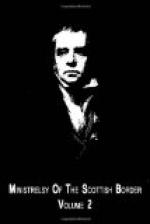Many copies of this ballad are current among the vulgar, but chiefly in a state of great corruption; especially such as have been committed to the press in the shape of penny pamphlets. One of these is now before me, which, among many others, has the ridiculous error of “blue gilded horn,” for “bugelet horn.” The copy, principally used in this edition of the ballad, was supplied by Mr Sharpe. The three last verses are given from the printed copy, and from tradition. The hackneyed verse, of the rose and the briar springing from the grave of the lovers, is common to most tragic ballads; but it is introduced into this with singular propriety, as the chapel of St Mary, whose vestiges may be still traced upon the lake, to which it has given name, is said to have been the burial place of Lord William and Fair Margaret. The wrath of the Black Douglas, which vented itself upon the brier, far surpasses the usual stanza:
At length came the clerk of the parish,
As you the truth shall hear,
And by mischance he cut them down,
Or else they had still been
there.
THE DOUGLAS TRAGEDY.
“Rise up, rise up, now, Lord Douglas,”
she says,
“And put on your armour
so bright;
“Let it never be said, that a daughter
of thine
“Was married to a lord
under night.
“Rise up, rise up, my seven bold
sons,
“And put on your armour
so bright,
“And take better care of your youngest
sister,
“For your eldest’s
awa the last night.”
He’s mounted her on a milk-white
steed,
And himself on a dapple grey,
With a bugelet horn hung down by his side,
And lightly they rode away.
Lord William lookit o’er his left
shoulder,
To see what he could see,
And there he spy’d her seven brethren
bold
Come riding over the lee.
“Light down, light down, Lady Marg’ret,”
he said,
“And hold my steed in
your hand,
“Until that against your seven brethren
bold,
“And your father, I
mak a stand.”
She held his steed in her milk-white hand,
And never shed one tear,
Until that she saw her seven brethren
fa’,
And her father hard fighting,
who lov’d her so dear.
“O hold your hand, Lord William!”
she said,
“For your strokes they
are wond’rous sair;
“True lovers I can get many a ane,
“But a father I can
never get mair.”
O she’s ta’en out her handkerchief,
It was o’ the holland
sae fine,
And ay she dighted her father’s
bloody wounds,
That ware redder than the
wine.
“O chuse, O chuse, Lady Marg’ret,”
he said,
“O whether will ye gang
or bide?”
“I’ll gang, I’ll gang,
Lord William,” she said,
“For ye have left me
no other guide.”
He’s lifted her on a milk-white
steed,
And himself on a dapple grey,
With a bugelet horn hung down by his side,
And slowly they baith rade
away.




